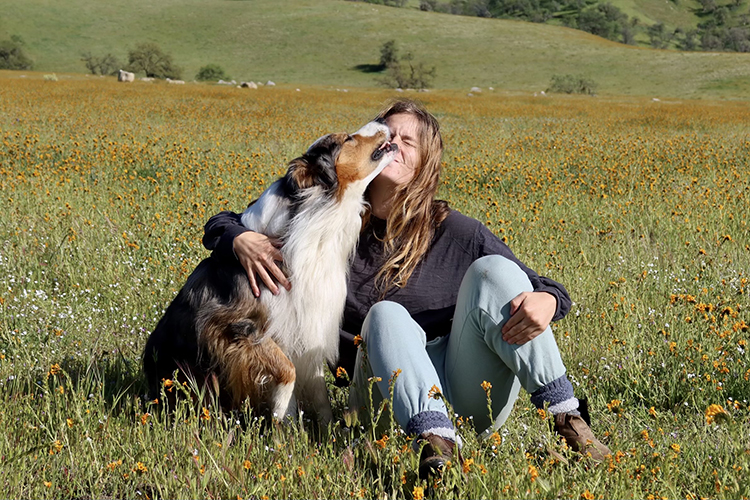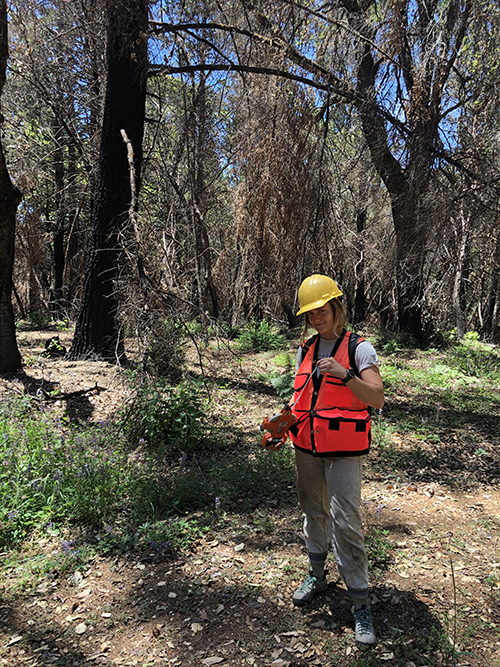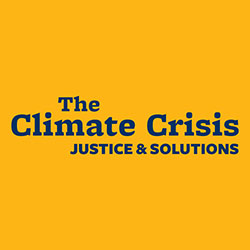Berkeley Voices: How one student finds hope in her ‘fellow earthlings’
"We have a shared history on this planet," said Hope Gale-Hendry, who is graduating from UC Berkeley in May. "I have a duty to stand by and to fight for as long as I possibly can for my fellow earthlings."
April 15, 2022
Follow Berkeley Voices, a Berkeley News podcast about the people and research that makes UC Berkeley the world-changing place that it is.
See all Berkeley Voices episodes.
In this episode of Berkeley Voices, Hope Gale-Hendry, a student graduating from UC Berkeley this May with a double major in ecosystem management and forestry, shares in her own words how she discovered her deep interconnectedness with all living things, and why she decided to study the American pika.
“We have a shared history on this planet,” said Hope. “That is the lesson that I have been able to use to foster my passion for conservation and foster this love and admiration that I have for my cousins on this planet. Not just humans, but moss and squirrels and horses and farm animals and lichen and every beautiful and unique species that has been on their own journey.”
This is the second episode of a two-part series about how to resist the feeling of doom that many of us feel when thinking about climate change. The first episode was an interview with Bree Rosenblum, a professor of global change biology, about why we need to confront the root causes of the environmental crisis we’re in.

Hope Gale-Hendry, a fourth-year UC Berkeley student double majoring in ecosystem management and forestry, spends time with her dog, Bjorn, in California’s Transverse Ranges in March 2022. “Bjorn is my companion, my best friend and my soulmate,” said Hope. “He takes care of me as much as I take care of him, and he teaches me lessons everyday, including the freedom of unconditional love.” (Photo courtesy of Hope Gale-Hendry)
Read a transcript of Berkeley Voices episode 98: How one student finds hope in her ‘fellow earthlings’:
Anne Brice: This is Berkeley Voices. I’m Anne Brice.
[Music: “TwoPound” by Blue Dot Sessions]
Today, we share a story about Hope Gale-Hendry, a fourth-year student at UC Berkeley who’s graduating this May with a double major in ecosystem management and forestry.
In this episode, Hope shares in her own words how she discovered at Berkeley her deep interconnectedness with all living things, and why she decided to study the American pika.
This is the second episode of a two-part series about how to resist the feeling of doom that many of us feel when thinking about climate change. The first episode was with Bree Rosenblum, a professor of global change biology, about why we need to confront the root causes of the environmental crisis that we’re in. Both episodes were produced by me and Kara Manke, a science writer for Berkeley News who’s leading a series on the climate crisis.
[Music fades out]
Hope Gale-Hendry: We have a shared history. We have a shared history on this planet. That is the lesson that I have been able to use to foster my passion for conservation and foster this love and adoration that I have for my cousins on this planet.
[Music: “Brek PKL” by Blue Dot Sessions]

Hope feeds turkeys while volunteering at the Animal Liberation Temple in Martinez, California. (Photo courtesy of Hope Gale-Hendry)
Not just humans, but moss and squirrels and horses and farm animals and, you know, lichen and every beautiful and unique species that has been on their own journey finding their own way.
My name is Hope Gale-Hendry, and I’m a senior studying ecosystem management and forestry. I grew up in Mapleton, Utah, a town of 5,000 people at the time.
And in my high school, the high school I went to, I felt pretty outcasted because I left the Mormon church when I was 14. I hated school, so I graduated high school with an eighth grade math education.
My parents were definitely, they prioritized going on a Mormon mission over going to college. My school was the same way. There were no college applications or touring campuses or anything at the high school I went to.
I moved out to California the day after I turned 18 to live with my boyfriend. I had no plans to go to college. I wanted to be a rock climbing guide and guide people up mountains. That’s what I thought my life’s purpose was. And living in a city, it’s hard to feel purposeful when your dream is to be in the mountains.
[Music fades out]
So, I got pretty depressed and felt purposeless and decided to take advantage of what a city has to offer, which was, for me, the opportunity of education. So, I was working at Starbucks full time and joined DVC, Diablo Valley College, a two-year transfer college. And I took one class.
Turns out, I really enjoyed learning. I really enjoyed expanding my intellect and dismantling the beliefs that I had upheld until that point.
I went on a study abroad to Spain. One of the classes offered on that study abroad was environmental biology. It was the first biology/ecology, like, nature-oriented class that I had taken up to that point.
And my professor Steve James told this story of famous naturalist Aldo Leopold on a hunting trip.
[Music: “Manny in Sound” by Blue Dot Sessions]
And they shot a wolf. And in Aldo Leopold’s words, the fierce green fire died in her eyes. And my professor started tearing up when he was telling that story. And I was, like, sobbing. I was more than tearing up. That was the moment when I was like, “This is what I want to study. I want to study nature. I want to study animals and forests.”
[Music fades out]
And at that point, I became really motivated in my academic career. And I actually decided to apply to UC Berkeley on that study abroad. I don’t even know what my declared major was. I applied and got rejected, quickly.
And after getting rejected, things became really real for me. I was like, I’m going to that school. I’m going to UC Berkeley. So, I really hit the ground running in my community college, got really involved, started tutoring calculus and geography, and volunteered at a native wildlife rehabilitation hospital. And applied to UC Berkeley under the declared major of forestry and I got in.
That was fall of 2020, was my first semester. Getting accepted to UC Berkeley was the most pivotal moment of my entire life.
I ended up dropping out that semester, the first semester, because of COVID, things went online and I couldn’t afford to pay tuition. It was this whole fiasco. So, my first real semester was spring of 2021 and that’s when I took Global Change Biology with Bree Rosenblum.

Hope holds up an issue of Breakthroughs magazine with UC Berkeley professor Bree Rosenblum on the cover. (Photo courtesy of Hope Gale-Hendry)
I could talk about Bree for hours. Bree is not just a scientist. She is a philosopher. I think she is one of the best, most phenomenal thinkers of our time.
One of the most impactful things that I learned in that class was the connection that every species on Earth has. We literally have a common ancestor with every single living organism on this planet. I think that class gave me the structure to truly define my own connectedness on this planet.
[Music: “Ranch Hand” by Blue Dot Sessions]
In the summer of 2021, I did a research assistantship with professor Scott Stephens at UC Berkeley. So, I spent most of the entire summer working on fire ecology and looking at the impacts of fire suppression on biodiversity, which was a really beautiful and important project.
But for some reason, I was slogging it the entire summer. I wasn’t invested. I wasn’t in it. And this really awesome little moment happened for me where after hiking in Yosemite for several weeks, I had taken notice of these little raised mounds and tunnels of dirt on the ground.
One night, I was lying in my tent and my head was against my inflatable pillow, which served as a little amplification device. And I heard this little (Hope makes digging sound) and I was like, “What is that? What is going on?” So, I raised my head to listen to what was happening and I couldn’t hear it anymore.

In summer 2021, Hope did a research assistantship working on fire ecology and looking at the impacts of fire suppression on biodiversity. It was then that she realized her true passion was studying wildlife. (Photo courtesy of Hope Gale-Hendry)
And so, then I put my head back down and it was like (Hope makes digging sound). And I realized that it was the little mammal, it was a mole under the ground digging its tunnel right below my tent. I wrote in my journal that night, “I want to study wildlife. It’s all about wildlife.”
And I recalled in community college, I had written a paper summarizing some research that had been done on the American pika.
[Music: “Pastor” by Blue Dot Sessions]
Pikas are these four- to six-inch-long lagomorphs in the rabbit and hare family. They look a lot like hamsters, but their eyes are bigger. Their ears are bigger. They are generally solitary creatures that spend their entire summer and snow-melted season collecting vegetation to build these hay piles that they will subsist on through the winter. They’re really unique because they don’t hibernate like a lot of other high-alpine species do.
[Music out]
And the American pika is considered the canary in the coal mine for climate change, such that they are extremely temperature sensitive and very likely going to go extinct in the next century.
So, I decided I’m going to study pika. I don’t know how. I don’t what’s going to happen. I don’t know what I’m going to do. But I’m going to do that.
So, I reached out to professor Rosenblum and was like, “What should I do?” And we got talking and I decided to go that summer to a backcountry hut that my partner had been working at the previous winter in Ouray, Colorado. And I stayed at that backcountry hut, where it is surrounded by pikas and basically spent three weeks just hanging out with pikas.
[Music: “Persimmon St” by Blue Dot Sessions]
One day, I decided to observe one specific pika. And this one runs all the way up the scree pile so quickly to this bush and gnaws on it and gets this probably foot-and-a-half-long branch and starts to pull the branch down to its hay pile.
And clearly the branch was too big. And so, this pika is struggling and it’s getting caught on stuff and can’t move very far. And so, he starts to nibble on the end of it and starts to break it into smaller pieces. He breaks off this three- to four-inch piece and runs it all the way down to its hay pile and runs back. And breaks off another piece and runs it all the way down to its hay pile and runs back.
That moment was really profound for me because clearly this little creature has, like, this intelligence that he knows, “This is a waste of energy. I’m going to have to do it a different way.” That pika was adapting. And I started crying in that moment and my partner started crying.

The American pika, a small mammal that’s part of the rabbit and hare family, is highly sensitive to warm temperatures and in danger of going extinct in the next century. “The American pika is considered the canary in the coal mine for climate change,” said Hope. (Photo by Hope Gale-Hendry)
These animals are so determined to make their hay pile big enough to collect as much as they can to survive and last through the winter. That, for me, was like, “Man, I have to do everything I can to ensure their survival, too.”
[Music fades out]
It is so heavy what is happening on our planet right now. And so, for me, I’ve decided no matter how painful or traumatizing it is to witness the sins of my species and to witness what it happening on this planet, I have a duty to stand by and to fight for as long as I possibly can for my fellow earthlings, my genetic family.
I am coming from a place that I have the opportunity to spend time in nature. And not everybody does. Not everybody has the resources to take time off work or the transportation to leave the city. This is something we’re not talking about enough. Like, how can we foster this sense of connection to nature when you live in a concrete jungle?
I think my hope and my suggestion for people is to find what they’re interested in, what sparks their passion, because unless the passion is there, it really doesn’t matter what you go do. If somebody doesn’t care about trees, going and spending time with trees isn’t going to do anything. If somebody doesn’t care about animals, going and hanging out with animals isn’t going to do anything. But to find what their passion is, what sparks their interest, what they’re curious about, and to dive into it.
[Music: “Blue Jay” by Blue Dot Sessions]
Even in the city, nature is all around us. So, it’s as much as that: taking a look at the ants inside your house or engaging with the birds outside your house, buying a bird feeder so you can watch the birds, planting native plants for pollinators and watching the different types of pollinators. You know, there’s birds, there’s bats, there’s flies, there’s moths, there’s butterflies, there’s bees.
Engaging with nature is just being an engaged person. I think that’s what engaging with nature is, is just observing everything around you. Because it is everywhere. It’s everywhere.
Anne Brice: This is Berkeley Voices. I’m Anne Brice. Special thanks to Kara Manke, who coproduced this episode.
This was the second episode of a two-part series about how building a sense of connection with our planet and all of its inhabitants is essential in reframing our time on Earth and our role in our changing climate and environment.
You can follow Berkeley Voices on Apple Podcasts, Spotify or wherever you listen. If you like what we do, please follow us and leave us a rating and review. You can find all of our podcast episodes with transcripts and photos on Berkeley News at news.berkeley.edu/podcasts.
Listen to other Berkeley Voices episodes:
